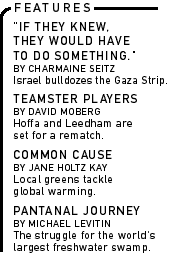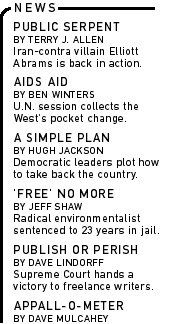

|

|

|

|
|
|
| |
|
|
|
I Saw Ramallah
Israel has denied Palestinians many things over the years besides self-determination and the right of return: water rights and building permits, economic development and freedom of movement. In all of this, the diplomatic and financial support of the United States has been crucial and, particularly in America, Palestinians have also lacked something else--"permission to narrate," in Edward Said's phrase. Here the story of Israel generally belongs to its boosters, even if this means the suppression of inconvenient facts and the virtual exclusion of Palestinian writers from the mainstream. This is the context in which poet Mourid Barghouti's memoir appears, if appears is the
"When the history of our era is written," writes Martin Peretz in his own New Republic, "terror will be seen as the Palestinians' distinctive contribution to modern politics." Never mind for now that the founding fathers of Israel, like those of Ireland and Algeria and many other post-colonial nations, were terrorists in the strictest sense of the term. The immediate consequence of using terrorists to symbolize Palestinians may soon be to license, in the words of the Jerusalem Post, "eliminating the Palestinian Authority and reoccupying Palestinian-controlled territory." Ariel Sharon just concluded a listening tour of the United States and Britain, looking for reassurance this will be all right with everyone. Resemblances to the early summer of 1982, before the "Peace for Galilee" invasion of Lebanon began, are unmistakable: Sharon is back in power and again looking for a cease-fire to break rather than hold. As the Israeli journalist Uri Avneri wrote in August of that year, the "original sin" of his colleagues was to use the word mehablim, or "terrorist," for "all PLO fighters" and ultimately for "the whole of the Palestinian people." It is unfortunate to use up so much of a review before discussing the book itself, but war dwarfs all books. Besides, one of the special virtues of Barghouti's book is its modesty. In a region blighted by competing versions of The Book, Barghouti has been content to write what is merely a book. I Saw Ramallah is fractured, provisional and honest; its last sentence, fittingly, is a question. More than this, Barghouti has an aversion to the symbols that are the intellectual currency of war and occupation: "All conflicts prefer symbols. Jerusalem is now the Jerusalem of theology. The world is concerned with ... the idea and the myth of Jerusalem, but our lives in Jerusalem and the Jerusalem of our lives do not concern it." But it is not only Israeli irredentism that relies on symbols. Exile from their homeland makes Palestinians susceptible to myth-making as well, forcing them to "adore an unknown beloved." When Barghouti crosses into the West Bank for the first time in three decades, he discovers a country not nearly so green as he remembered it. He looks at the land and asks himself, "What is so special about it except that we have lost it?" And while he is happy to return, as his brother who died in Jordan was never allowed to do, it does not gratify him that some things are just as they were: "The Occupation forced us to remain with the old. ... It did not deprive us of the clay ovens of yesterday, but of the mystery of what we would invent tomorrow." I Saw Ramallah is a rare memoir, anti-nostalgic and unromantic. Part of its charm is that Barghouti, by nature an unpolitical man, wishes it could also be without politics. Even when on a march he can't bring himself to shout slogans, and he prefers to all symbolism "the scent of dark coffee and cardamom coming from the dark end of the guesthouse wall." But with most Palestinians living either under occupation or as refugees, politics are inescapable, entering "into the most miniature details of the souls of our men and our women." I Saw Ramallah is best at illustrating the fearsome extent of the occupation--an occupation not only of land, but finally of thoughts and gestures. And, of course, of the storyline. Barghouti's often funny book--he belittles the noble etymologies of his surname and concludes that it must be derived from al-barghout, or "the flea"--is strikingly free of anger. This makes its single cry the more telling: "The Israelis occupy our homes as victims and present us to the world as killers." It seems likely that large numbers of the "killers" are about to get killed. "Sharon Visit Will Pitch Retaliation," ran a headline in the June 25 Los Angeles Times. This pitch might be a harder sell here if Palestinians more often got to speak for themselves. As it is, desperate young men in the occupied territories are not altogether wrong in feeling that, as far as we are concerned, they are most eloquent as corpses. Benjamin Kunkel has written for The Nation, Dissent and other publications.
|


